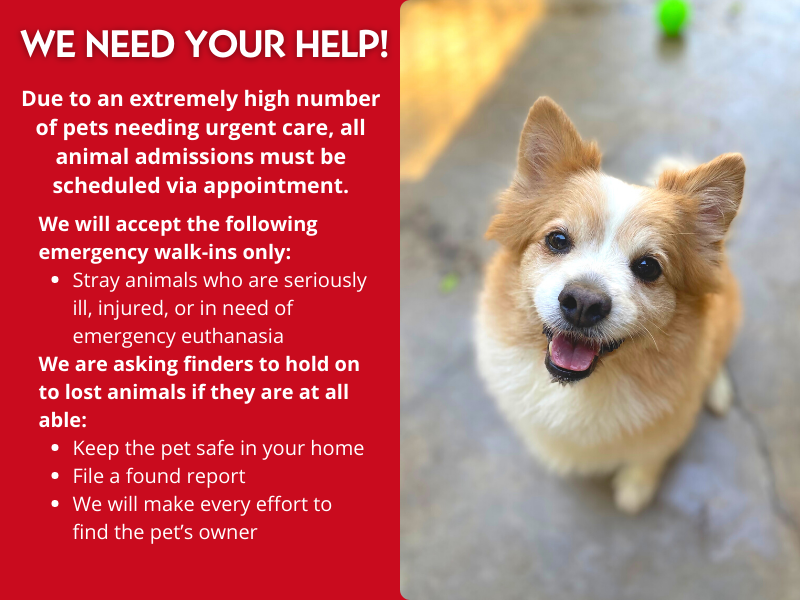There is no time limit. We keep animals for as long as it takes to find them a home. Our clinic treats the more than 20,000 animals that come into our care each year. Our veterinarians perform more than 7,000 spay/neuter surgeries annually–that’s nearly 20 per day; along with evaluating and treating 400 to 600 shelter animals who arrive each week. We urge pet owners to develop a relationship with a local veterinary clinic to address the health and wellbeing of their companion animals. We have about 100 staff members. Your landlord is required to make reasonable accommodations for you as required by the Americans with Disabilities Act (ADA) and Fair Housing Act (FHA). Find detailed information here or contact the State of Hawaiʻi’s Disability and Communication Access Board (DCAB) at 586-8121 and/or the Hawaiʻi Disability Rights Center (HDRC) at 949-2922 for specific information regarding the law. No one should have to choose between a roof over their head or a pet. The Hawaiian Humane Society advocates to increase the number of residences that allow pets. We also maintain a list of pet-friendly properties, but a location’s presence on the list is not an indication that it has a current vacancy. Find the listing, or add information about a pet-friendly property, here. Want to know where we stand on animal welfare issues like this and more? Visit our Where We Stand page. By law, dogs must be leashed on all public property except for off-leash dog parks. Dogs must be leashed when on the beach or swimming in the ocean. Dogs may be allowed off-leash on private property with the permission of the property owner. Establishing an off-leash dog park takes an enormous amount of grassroots advocacy. Some of the dedicated volunteers who have gone through this process shared their tips with Hawaiian Humane and you can find guidelines here. It is against City & County of Honolulu law for a dog to bark constantly for 10 minutes, or unprovoked for 30 minutes on and off, to the disturbance of others. Dogs bark for many reasons, some of them are perfectly natural and to be expected, others can be a sign that the animal is in distress. Try talking to your neighbor first. If the barking is happening when the neighbor is not at home, he or she may be unaware of the issue. When crowing continues for 10 continuous minutes or intermittently for 30 minutes, it is a violation of the animal nuisance law. Keeping more than two chickens in a residential area is also a violation. If you are having a problem with a neighbor’s roosters, try talking to your neighbor first. Another resource for resolving the situation is through mediation. Contact the Mediation Center of the Pacific at 521-6767 or visit https://www.mediatehawaii.org/. Ask your sitter to keep your pets indoors. If your pets become lost, have your sitter call the Hawaiian Humane Society immediately. File a lost report Here. Also make sure your pets have microchip identification and that your current contact information is on file with your microchip provider or a universal online database. If you will be traveling to an area where you will not have reliable cell phone or email service, please add your pet sitter’s contact information to the microchip registration. Learn more on our pet ID page. Military base housing falls under federal jurisdiction and Hawaiian Humane can only enter military bases with permission from the proper authorities. Cruelty cases must be investigated in partnership with base authorities. Military personnel who may be facing cruelty charges for acts committed on base must be prosecuted under the federal penal system. We can provide investigative resources and case files. So many pets are now sold online, that this is a broader issue than simply banning retail sales. The Hawaiian Humane Society urges would-be pet owners to obtain animals from shelters, pet stores who offer shelter animals for adoption, or responsible breeders. Responsible shelters and breeders will welcome animals back if they are not a good fit for their new family. Retail outlets and online sellers may obtain animals from irresponsible local breeders, foreign puppy mills or from the wild. The welfare of the individual animal may not be a priority and many retailers provide no education about the special needs of each animal or possible health concerns. We support regulations that require humane standards of care for the breeding, display, transportation and sale of animals. Want to know where we stand on animal welfare issues like this and more? Visit our Where We Stand page.

